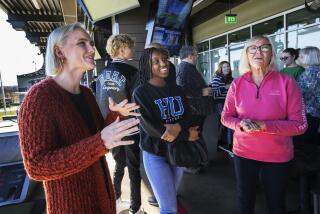Pakistani Who Killed 2 at CIA Is Executed
WASHINGTON — Mir Aimal Kasi, a Pakistani convicted in the ambush slayings of two CIA employees nearly a decade ago, was executed by injection Thursday night at a Virginia state prison amid warnings of possible reprisals in this country and abroad.
Kasi, 38, was pronounced dead at 9:07 p.m. EST at the Greensville Correctional Center in Jarratt, Va., after the Supreme Court declined to grant a stay of execution earlier in the day and Gov. Mark Warner refused to consider a request for clemency.
Kasi’s last words, repeated in his native language until he lost consciousness, were “There is no God but Allah,” said Larry Traylor, a spokesman for the Virginia Department of Corrections.
In recent media interviews, Kasi said he had no regrets for the January 1993 attack on a busy road in McLean, Va., just outside CIA headquarters. But he did hope that there would be no retaliation from those groups in Pakistan and Afghanistan who heralded him as a hero after FBI agents arrested him in 1997 in a small hotel along the border of the two countries.
“Personally, I don’t encourage anybody to attack Americans,” Kasi said in the interviews.
In Pakistan, Kasi’s last day was marked by a smattering of anti-American protests. Some activists called for his sentence to be commuted to life in prison. A rally of about 150 members of Kasi’s tribe in Pakistan marched through the streets of Quetta, near the Afghan border, and chanted, “Aimal is our hero.” They also burned a U.S. flag.
“Aimal is not a terrorist,” tribal elder Ibrahim Kansi told demonstrators. “His action was a reaction to what was happening to Muslims in Chechnya and Palestine.” Kasi has said that the shooting was a protest against U.S. foreign policy toward Muslim nations.
Federal authorities never found any links between Kasi and terrorist organizations, such as Osama bin Laden’s Al Qaeda operation. After Sept. 11, 2001, Kasi decried the attacks on the World Trade Center because innocent lives were lost, but he said he felt that the attack on the Pentagon seemed justified.
In the last week, the State Department has warned Americans that Kasi’s execution could prompt acts of revenge in this country and against U.S. interests abroad.
As a safeguard, extra security was placed around the prison in southern Virginia and at the state Capitol in Richmond.
At the White House, spokesman Scott McClellan said Thursday: “Our thoughts and prayers go to the families of the victims. This is a criminal justice matter, and the decision of the jury is being carried out.”
Just as CIA employees were reporting to work on Jan. 25, 1993, Kasi stepped out of his pickup and began firing an AK-47 rifle near the entrance to the agency’s headquarters.
Killed were Frank Darling, a 28-year-old CIA covert operations employee, and Lansing Bennett, 66, a physician and agency intelligence analyst. Three other men were wounded.
Kasi fired 11 times, and stopped shooting only when there were no more men in his gun sight. He thought killing women would be wrong because he believed that only men have power in the United States. He fled, but the FBI tracked him to Pakistan more than four years later and returned him to Virginia for trial.
He was convicted of murder in 1997 and sent to Virginia’s death row. His last meal request was for fried rice, bananas, boiled eggs and wheat bread.
Iqbal Jafree, a Pakistani lawyer working on behalf of Kasi’s family, said Kasi never should have been returned to the United States. “The Pakistan government and the government of the United States have let him down,” Jafree said.
The defendant’s brother said Kasi had called his mother Thursday, asking her “to have courage.”
“He told her to give his wishes to the motherland and to the people of Pakistan, and asked them to pray for him,” Nasibullah Kasi added.
In Washington, Darling’s family issued a statement recalling the “beautiful love story and marriage” he had had with his wife, Judy. She was in the car and witnessed her husband’s murder.
The family also noted that the U.S. justice system had been heard.
“On Thursday, we will spend time in prayer for Kasi,” they added, “that God will have mercy on his soul, for his family, that there be no terrorism reprisal, and for world peace.”
More to Read
Sign up for Essential California
The most important California stories and recommendations in your inbox every morning.
You may occasionally receive promotional content from the Los Angeles Times.











